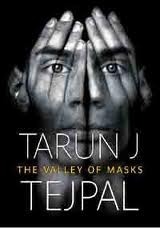What do you think?
Rate this book


348 pages, Hardcover
First published July 14, 2011
Someone is laughing so hard it is ripping open the night.
Not all the wood in the world became a chair unless you knew how to craft it. From all the gallons of information being poured into us, we had to distil wisdom.
Men can genuflect to greatness if it comes from afar; up close, they want to nail it to the cross.
It's the principle on which men must operate. Do what they ought to, in the faith that someone else will do what they ought to.